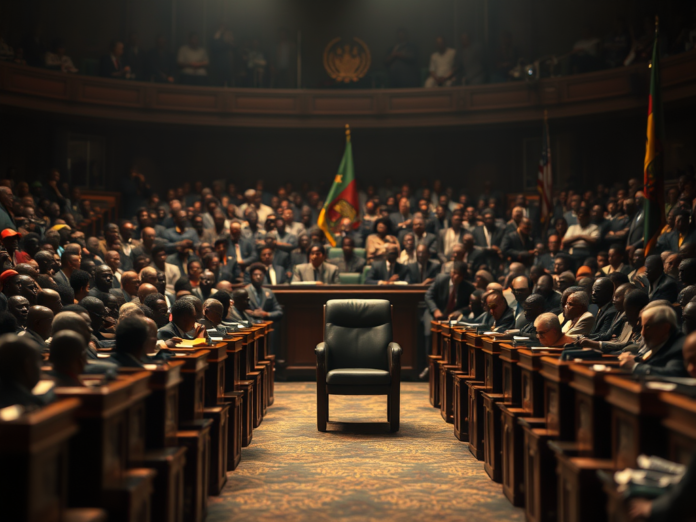In the wake of a controversial visit by several opposition Citizens’ Coalition for Change (CCC) Members of Parliament (MPs) to President Emmerson Mnangagwa’s farm, reactions across Zimbabwe have been charged with disappointment, cynicism, and frustration. The MPs, led by CCC interim secretary general Sengezo Tshabangu, visited Mnangagwa’s Precabe farm and publicly endorsed his bid to extend his stay in power beyond the constitutionally allowed two terms, leading to a wave of reactions that expose the deep divisions within Zimbabwean politics.
A Betrayal of the Electorate?
The parliamentary tour, which was supposed to focus on familiarizing legislators with Mnangagwa’s farming operations, quickly morphed into a political gathering that openly supported the President’s 2030 agenda. Tshabangu’s remarks, affirming that if the tour improved Mnangagwa’s chances of staying in power, “then let it be,” were met with approval from Zanu PF members present but were described as a betrayal by many within the opposition.
Former CCC MP, Fadzayi Mahere, decried the actions of the MPs, calling the event “a mockery” of democracy and describing the current Parliament as “a crime scene.” She condemned the lawmakers for supporting what she called a political farce, undermining the efforts of those who fought for genuine opposition in the previous elections. Mahere’s outrage was mirrored by opposition figures such as Job Sikhala, who labeled the MPs as collaborators with the regime, stating that those who aligned themselves with Mnangagwa should be treated as enemies of the people.
A History of Power Struggles
The responses to the article, while largely critical of the MPs involved, also reflect a broader sense of disillusionment with Zimbabwe’s political landscape. Zuze, in a philosophical reflection, invoked Mahatma Gandhi’s belief in the eventual fall of tyrants, implying that even the most powerful figures—like Jonathan Moyo and Gideon Gono—who once seemed invincible, ultimately fall from grace. This sentiment echoed a prevailing view that political power in Zimbabwe, whether exercised by Zanu-PF or opposition forces, is transient and often marked by cycles of betrayal and eventual downfall.
Intra-Party Divisions and Allegiances
A central theme in the responses was the growing skepticism toward the opposition itself. Doctor Do Little took aim at figures like Welshman Ncube, Thokozani Khupe, and Nelson Chamisa, accusing them of being compromised by Zanu-PF or being ineffective in their opposition efforts. He suggested that the CCC, led by Chamisa, was filled with individuals who had too much political baggage, some even planted as moles by Zanu-PF. The notion of “moles” in the opposition became a recurring point of contention, with many questioning the true loyalty of certain figures within the CCC.
This sense of betrayal was compounded by Garwe, who accused Mahere and Chamisa of causing disarray within the opposition, especially over candidate selections and lack of party structure. The criticism was not limited to individual leaders but extended to the opposition’s broader political failures, which some felt were making way for Mnangagwa’s continued rule.
A Shift in Political Calculus
Meanwhile, Zipud offered a more cynical prediction, forecasting that Tshabangu would eventually formalize his allegiance with Zanu-PF, speculating that he would be rewarded with a senior government position. The idea of political figures switching sides or embracing the ruling party to secure their personal interests was a recurring theme in the commentary, with many questioning the authenticity of political movements that seem driven by self-preservation rather than genuine democratic change.
The argument about political opportunism was furthered by Honest, who, after years of predicting the demise of the CCC, seemed to have adjusted his views to accept the potential for constitutional changes that could extend Mnangagwa’s rule. This “pivoting” was pointed out by Zipud, who sarcastically noted the consistency of shifting political stances in Zimbabwe, where allies and adversaries alike seem willing to change their positions when it suits them.
Conspiracy Theories and Political Machinations
In the more extreme corners of the debate, figures like BoboJukwa suggested that Mnangagwa’s health issues were being manipulated by his wife, Auxilia, to orchestrate a dynastic succession for their son. Though this theory was dismissed by The Entrepreneur, who defended Mnangagwa’s political acumen, it reflected the deep mistrust that permeates Zimbabwean political discourse. The suggestion that Mnangagwa’s leadership was merely a stepping stone for his family to consolidate power further fueled the cynicism surrounding Zimbabwe’s political future.
Looking Ahead: Uncertainty and Disillusionment
As the debate unfolds, one thing remains clear: Zimbabwe’s political environment is fraught with uncertainty, betrayal, and frustration. Many Zimbabweans, whether inside or outside of political parties, feel trapped in a cycle where power struggles are more about self-interest and survival than genuine change. Whether it’s opposition members aligning with Zanu-PF or the public’s growing apathy toward leadership, the country’s political future remains unclear. The idea that the system is rigged or manipulated for personal gain seems to resonate with many, who, despite their desire for reform, feel helpless in the face of entrenched political power.
In the end, the question remains: can Zimbabwe ever break free from its cycles of betrayal, factionalism, and self-interest to achieve meaningful political transformation? The answer, it seems, will only be revealed in time.
